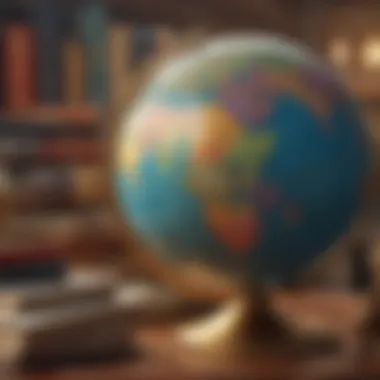Key Literature Shaping Our Understanding of World History


Intro
World history is not just a timeline of events; it’s a rich tapestry woven from myriad narratives, perspectives, and voices. As the saying goes, "History is written by the victors," which underlines the importance of diverse literature in unpacking the complex layers of our collective past. This article highlights influential books that delve into pivotal moments and themes in world history, serving as a guidepost for understanding the forces that have shaped our global landscape.
Through literature, readers can grasp the cultural, socio-political, and economic circumstances that influenced pivotal events, from the rise and fall of empires to age-old conflicts that continue to echo in contemporary society. Whether you’re a student diving into a history class, a professional seeking a deeper understanding of global interactions, or an avid reader keen on broadening your horizons, the books discussed herein will affirm their relevance to today’s world.
Key Themes Explored
Books about world history often revolve around recurring themes that provide insights into humanity's journey. Understanding these themes can significantly enhance our comprehension of the texts and their broader implications.
Theme Highlights
- Cultural Exchange and Interaction
The narrative of world history is incomplete without emphasizing the cultural interactions that enriched civilizations. Books such as "Guns, Germs, and Steel" by Jared Diamond provide a lens through which we view how geography and environment shaped human societies. - Power and Governance
The struggles for power, be it through war, diplomacy, or colonization, paint a vivid portrait of human endeavor. For instance, "The Rise and Fall of the Great Powers" by Paul Kennedy examines how the ebb and flow of military and economic might have changed the course of nations. - Social Movements and Change
Themes of resistance and transformation are critical to understanding world history. In "The Wretched of the Earth" by Frantz Fanon, readers are exposed to the psychological impacts of colonization and the urgent need for societal change, prompting reflection on current global inequalities.
Relevant Quotes and Insights
"History is a set of lies agreed upon." — Napoleon Bonaparte
This thought-provoking insight reminds readers to approach historical narratives with a discerning mind. Books like "A People's History of the United States" by Howard Zinn challenge mainstream historical accounts, urging us to listen to voices often silenced in history lessons.
Actionable Takeaways
For those looking to deepen their understanding of world history, the following advice may prove helpful.
Practical Tips and Strategies
- Diversify Your Reading: Explore works by authors from different cultural backgrounds to gain varied perspectives on historical events.
- Engage with Primary Sources: Look for autobiographies, letters, and documents from critical periods to connect with individuals’ experiences rather than just events.
- Join Discussions: Participate in forums on platforms like Reddit, where history enthusiasts share insights, debate, and suggest further readings.
Suggested Further Reading
- "The History of the Ancient World" by Susan Wise Bauer
- "Sapiens: A Brief History of Humankind" by Yuval Noah Harari
- "The Silk Roads: A New History of the World" by Peter Frankopan
By engaging with these themes and selected texts, readers can forge a more nuanced connection to the complexities of the human journey, replete with lessons applicable to current global dynamics.
Prelude to World History Literature
World history literature serves as a window into the human experience across time and geography. It provides a tapestry of perspectives that weave together the complexities of human behavior, social changes, and monumental events. Understanding this literature is essential not only for academic endeavors but also for fostering a well-rounded worldview. It invites readers to explore the intricacies of cultures that shaped our present.
One of the main benefits of delving into historical texts is their ability to offer critical insights into societal evolution. This isn't merely a dry recount of facts and dates; instead, it breathes life into the past, making connections that resonate with our contemporary issues. Readers can draw parallels between ancient civilization struggles and today's global challenges, such as economic disparities or the fight for human rights. This contextual understanding is invaluable.
It's also important to consider the role of historical literature in cultivating empathy. When we read about the struggles of people long gone or those in distant lands, we're compelled to reflect on our own lives and choices. This multidimensional engagement nudges us toward a more compassionate view of humanity. Through stories of triumph and tragedy, we learn that while times may change, the essence of human emotion remains consistent.
Importance of Understanding Historical Context
Gaining a firm grasp on historical context is crucial for interpreting texts accurately. Without this background, one might misread events or overlook the motives behind historical figures’ actions. Each narrative is anchored within a specific time and place, influenced by the political, economic, and social fabric of the era.
For instance, when studying the Renaissance, understanding the cultural rebirth in Europe helps explain the flourishing of art and science at that time. Without this lens, a reader might merely view it as a series of unrelated occurrences, missing the broader implications of innovation and how they challenge or reaffirm societal norms.
Moreover, engaging with different historical contexts can enhance critical thinking skills. Readers are often forced to grapple with contradictions and varying interpretations of events. This complexity sharpens the mind, urging individuals to question and analyze rather than accept information at face value.
What Defines a Great Historical Work?
Defining a great historical work involves multiple criteria, and it's not solely about the narrative's popularity. A significant text usually combines thorough research with compelling storytelling, making it both informative and engaging. A great historical work doesn’t shy away from controversies or the uncomfortable truths of human behavior. Instead, it embraces complexity and presents it in a way that encourages debate and reflection.
Quality of writing is also paramount. The best works often exhibit a unique voice that captures the reader's attention. This could be through vivid descriptions that transport one to a different time or through engaging dialogues that make historical figures relatable. The balance between academic rigor and accessibility is what allows a book to resonate with a wider audience.
At the end of the day, a great historical work invites its readers to think differently. It ignites curiosity about the past and its implications for today. It nudges individuals to not just view history as static but as a dynamic force that actively shapes the present and influences the future.
Key Themes in World History Literature
Understanding the key themes in world history literature is essential when navigating the vast ocean of human experience portrayed in books. These themes act as essential signposts, guiding readers through the complexities of humanity’s past. They help us grasp how political, cultural, and social currents have shaped societies across millennia. Recognizing these themes also assists us in gleaning insights from historical narratives, making connections between past events and present realities.
Politics and Power Dynamics
One of the most salient themes throughout history is the interplay of politics and power dynamics. This theme underscores how authority is established, maintained, and contested, influencing the trajectory of nations and societies. Historical literature often presents vivid accounts of rulers, revolutions, and uprisings. Books like "The Prince" by Niccolò Machiavelli illuminate the strategies employed by leaders to gain and consolidate power. Meanwhile, works such as "The Communist Manifesto" juxtapose the interests of the ruling class against the struggles of the proletariat, offering a comprehensive view into class struggle as a central political dynamic in human history.
Power can be visualized not just in political terms, but also in economic and cultural contexts. For instance, Jared Diamond’s "Guns, Germs, and Steel" articulates how geographical and environmental factors shaped the power disparities among different civilizations. Understanding these dynamics is crucial; it reveals not only the events themselves but also the ideologies and motivations that underlined them, making sense of how they resonate in contemporary socio-political contexts.
Cultural Exchanges and Interactions
Cultural exchanges serve as a reminder that history is seldom a solo act; it is inherently collaborative. From trade routes like the Silk Road to the age of exploration, numerous interactions between diverse groups have manifested countless innovations and societal shifts. Books such as "1491: New Revelations of the Americas Before Columbus" by Charles C. Mann delve into the rich tapestry of cultures before western contact, showcasing the importance of indigenous perspectives and historical narratives often overlooked.


Moreover, cultural exchanges can also shed light on the dissemination of ideas and ideologies. The Renaissance, for example, was not merely a European phenomenon but a result of interactions with the Islamic world and Asia. This underscores the idea that cultures do not exist in isolation; they enrich each other through exchange. Readers glean valuable insights from works beholding these interactive histories, leading to a more nuanced view of global interconnectedness that remains relevant today.
Societal Changes and Movements
The theme of societal changes and movements uncovers the waves of transformation that ripple through history. From social justice movements to technological advancements, these shifts often symbolize the quest for progress or the struggle against oppression. Literature exploring this theme includes seminal works like "The Diary of a Young Girl" by Anne Frank, contextualizing human rights struggles during the Holocaust, and more contemporary works analyzing the civil rights movement in the United States.
Such texts provide crucial context for understanding the forces behind societal changes. They not only recount events but also explore the motivations and aspirations of individuals and groups attempting to redefine their identities or push against systemic injustices. Furthermore, recognizing the cyclical nature of these movements can inform current social discourse, highlighting that the struggles of today are often echoes of those seen in the past.
Historical literature invites us to peel back layers, offering a glimpse into the rich narratives that define human existence across the ages.
In summary, exploring key themes in world history literature allows readers to engage deeply with the human experience. By understanding politics, cultural exchanges, and societal changes, we enrich our knowledge base and potentially apply these lessons to contemporary challenges.
Notable Authors in Historical Literature
The realm of historical literature boasts a plethora of voices that each contribute a unique shade to our understanding of the past. The authors discussed in this section are not just writers; they're storytellers, educators, and, at times, provocateurs who compel us to rethink accepted narratives. Their works highlight varied perspectives, crossover themes, and pivotal moments in history, shaping not only the narrative of the past but also our interpretation of present-day issues.
Howard Zinn and 'A People's History of the United States'
Howard Zinn’s landmark book, A People's History of the United States, stands as a touchstone in historical studies. Released in 1980, Zinn’s work shakes the fabric of traditional historiography. Instead of recounting history through the lens of powerbrokers and elite figures, Zinn focuses on the experiences of ordinary people—workers, minorities, and dissenters. He asserts that the conventional narrative often overlooks the struggles and victories of those whose voices are frequently silenced.
This approach not only makes history more accessible but also essential for understanding current societal dynamics. Zinn writes in an engaging manner, employing a straightforward narrative style that breaks down complex sociopolitical concepts. For students and professionals alike, this book serves as a call to analyze historical events from a fresh perspective, prompting critical thinking about systemic injustices that persist in society today.
"History is not a simple story of great men but rather a complex tapestry woven from the struggles and aspirations of countless individuals."
Jared Diamond's 'Guns, Germs, and Steel'
Jared Diamond's Guns, Germs, and Steel is not just a book—it’s a sweeping inquiry into the underpinnings of global power. Published in 1997, it aims to explain why certain civilizations developed more advanced technologies and larger empires compared to others. Diamond posits that geographical and environmental factors—not inherent differences among peoples—played a crucial role in determining the fates of civilizations.
Through meticulous research, Diamond explores themes of agricultural development, access to resources, and the diffusion of innovations. This perspective invites readers to cross-examine how historical trajectories were shaped not by simple narratives of conquest, but by complex interdependencies and contingencies. For those interested in comprehending the broader strokes of world history, this work provides essential insights into the factors that influence societal evolution.
Yuval Noah Harari and the Global Perspective
In Sapiens: A Brief History of Humankind, Yuval Noah Harari offers an ambitious overview of humanity’s journey from the Stone Age to the modern age. His ability to synthesize vast amounts of information into digestible chapters is impressive yet grounded in academic rigor. Harari deftly intertwines history with a philosophical examination of what it means to be human, drawing connections between historical events and contemporary issues.
His subsequent works, such as Homo Deus and 21 Lessons for the 21st Century, further this exploration, confronting modern challenges with historical context. Harari's narrative underscores the significance of understanding our past to make informed decisions about the future. Through his global perspective, he offers a thought-provoking lens that encourages critical discourse on human civilization's trajectory, especially in an era of rapid change and uncertainty.
In summary, these authors not only contribute immensely to historical literature but also challenge their readers to carve their paths through critical exploration of the past. Engaging with their works equips students, professionals, and avid readers with the intellectual tools needed to navigate the complexities of human history.
Exploring Different Historical Approaches
When delving into world history literature, the methods through which historians interpret events are vital. These approaches not only shape the narrative but also influence how we come to terms with our past. Understanding different historical approaches allows readers to appreciate the depth and complexity of history, guiding them through varying perspectives, methodologies, and interpretations. This exploration provides a critical framework for analyzing the literature on world history, recognizing that the lens through which history is viewed can alter its significance entirely.
Narrative History vs. Analytical History
Narrative history seeks to tell the story of the past in a way that is compelling and accessible. It often incorporates rich descriptions and emotional engagement, allowing readers to connect with significant events on a personal level. Great examples can be found in works like Barbara W. Tuchman's "The Guns of August," which examines the opening months of World War I in a narrative style that draws readers into the drama of the unfolding events.
Contrastingly, analytical history prioritizes scrutiny over storytelling. It aims to dissect factors contributing to historical developments, such as economics, politics, or social structures. This kind of historiography encourages readers to critically assess causes and outcomes rather than simply recounting events. An example would be Eric Hobsbawm's "The Age of Extremes," which focuses on the intricacies of socio-political shifts in the 20th century, benefiting those who seek a deeper understanding of historical narratives.
Both approaches enhance our grasp on the past but do so in very different ways. While narrative history evokes a sense of connection, analytical history cultivates a more critical mindset, urging readers to question and investigate the deeper meanings beneath the surface.
Microhistory as a Lens to the Past
Microhistory offers a unique vantage point by zooming in on specific events, individuals, or communities. It attempts to highlight smaller elements that often get overlooked in broader historical narratives. Authors like Giovanni Levi and Carlo Ginzburg have brought microhistory to prominence, revealing how seemingly mundane details can shed light on larger historical phenomena.
For instance, Ginzburg's "The Cheese and the Worms" investigates the life of a 16th-century miller, using this singular case to illustrate cultural tensions of the time. By focusing on such microcosmic examples, readers can grasp the nuances of daily life, values, and societal norms that may shape historical narratives in profound ways.
Incorporating microhistory into the broader study of world history invites deeper empathy and understanding. It encourages a more personalized approach to history, showcasing how individual experiences and small-scale events contribute to the grand tapestry of humanity's journey.
"By looking closely at the minutiae of the past, we can unravel the complexities of human experience that larger historical forces often overshadow."
Influential Historical Periods in Literature
Understanding the influential historical periods represented in literature gives readers a window into how societies evolved over time. Each period not only reflects a set of circumstances but also shapes the narrative styles and themes that resonate through various works. Different epochs are marked by distinctive challenges and breakthroughs that authors respond to, maintaining a dialogue across generations. Readers, including students and professionals, gain deeper insights into social structures, cultural movements, and revolutions that have defined human experiences.
The Ancient Civilizations
The literature surrounding ancient civilizations acts as the backbone of many concepts in world history. Texts from Egyptian, Mesopotamian, and Greco-Roman eras offer more than just stories; they serve as powerful artifacts revealing the values, beliefs, and conflicts of those times. For instance, the remains of the Epic of Gilgamesh provide a glimpse into the hero's journey while also underscoring early humanity's grappling with existential questions.
Key Points:
- Ancient works often combine myth, history, and philosophy.
- They form a narrative thread that connects early societies' understandings of law, morality, and governance.


The Age of Enlightenment and Revolutionary Thought
The Enlightenment was a period steeped in the pursuit of knowledge, reason, and individual rights. Literature from this era, such as Rousseau's Social Contract, plays a pivotal role in changing perspectives on governance and societal roles. Enlightenment authors not only questioned existing structures but challenged readers to think critically about the status quo.
"Man is born free, and everywhere he is in chains."
—Jean-Jacques Rousseau
Here, the call for social and political reform resonates even today, revealing how literature can act as a catalyst for revolutionary thought, often at great personal risk to the authors.
Benefits of this literature:
- It fosters a critical examination of authority.
- It illuminates the journey toward democracy and individual rights.
The Impact of the World Wars
The World Wars reshaped global dynamics and societal structures. Literature from and influenced by these monumental events remains strikingly poignant. Works like Erich Maria Remarque's All Quiet on the Western Front make the grim realities of war palpable. These texts create powerful contrasts between the glorification of warfare seen in earlier works and the disillusionment that followed.
Considerations when studying this literature:
- The trauma and Psychological impact of war are front and center.
- They reveal how conflict can redefine national identities and personal narratives.
Additionally, literature documenting these periods serves a dual purpose: preserving the memories of those who suffered while also critique ongoing conflicts. By appreciating how these periods shaped literature, readers can better grasp the complexities of humanity's journey.
Geographical Focus in Historical Literature
Geography holds a critical position in the understanding of history, shaping narratives and influencing the course of events across the globe. This part of the article zeros in on how literature from various regions not only narrates history but also reflects the unique cultural, social, and political tapestries that define each locale. By diving into geographical focuses, readers gain a richer appreciation for how diverse environments have molded societal behaviors and historical trajectories.
Books positioned within their geographical contexts allow us to connect the dots between events and their broader implications. This adds layers to our understanding of how history unfolds, echoing the subtle nuances that each region contributes to human experience. Thus, literature becomes a voice for the past, celebrating historical complexities while also fostering a sense of empathy towards different cultures and histories.
Europe: The Cradle of Modern History
Often referred to as the cradle of modern civilization, Europe has been pivotal in shaping various ideologies and political systems that resonate today. Works like Eric Hobsbawm's "The Age of Revolution" delve into the upheavals that spurred modern democracy, nationalism, and industrialization. Here, the Enlightenment emerges as a powerful force driving social reform and intellectual awakening, leading to revolutions that altered the course of European history.
The geography of Europe, with its myriad nations, languages, and cultures, also brings forth tensions and conflicts. Literature like "Europe: A History" by Norman Davies encapsulates the richness of European history, but it also uncovers dark chapters marked by wars and colonization. The juxtaposition of enlightenment with conflict creates a textured narrative, unveiling how geography and history intertwine to form the continent we know today.
Asia: A Tapestry of Cultures and Conflicts
Asia's literary contributions to historical scholarship are characterized by their diversity and depth. The continent, home to some of the oldest civilizations, showcases a compelling narrative woven from unique cultures, languages, and conflicts. Notably, books like "The Silk Roads: A New History of the World" by Peter Frankopan explore Asia's role as a crucible for cultural exchange and trade, establishing connections that span centuries.
In addition, the impact of colonialism and its aftermath on Asian societies is articulated through works like "Asian Experiments: A History of Ideas and Activism." These texts illuminate the struggles between tradition and modernity across the vast region, giving voice to historical figures often overshadowed by larger narratives. Understanding Asia through its literary texts not only provides insights into conflicts but also unveils stories of resilience and cultural richness.
The Americas: From Indigenous Societies to Colonization
The history of the Americas paints a vivid picture of transformation driven by colonization and cultural exchanges. Books such as "1491: New Revelations of the Americas Before Columbus" by Charles C. Mann illuminate the complexity of indigenous societies prior to European contact, challenging commonly held myths and presenting a more nuanced view of early American history.
Moreover, the extensive literature focusing on colonization, including works like "American Colonies: The Settling of North America" by Alan Taylor, helps contextualize the drastic changes that took place when settler societies clashed with established indigenous cultures. This division of histories offers insights into the legacies of colonization, the struggles for identity, and the ongoing challenges faced by indigenous communities today. The narratives that emerge are vital for understanding the intricate history of the Americas and its ongoing socio-political ramifications.
"The study of history is inextricably linked to geography; one cannot fully grasp the past without a solid understanding of the places in which historical events unfolded."
This exploration through literature encourages a holistic perspective, underlining how geographical features are not merely settings for historical events but influential factors that shape the narratives and identities of societies.
Challenges in Historical Narration
In understanding world history, we stumble upon various challenges that shape how narratives of the past are formed and articulated. These problems don’t just obscure our view of history; they can also skew our present understanding of social, political, and cultural dynamics. Navigating through these challenges is essential for students, professionals, and avid readers alike, as it allows for a more nuanced appreciation of historical texts and their implications.
Bias and Subjectivity in History Writing
One significant hurdle in recounting history is recognizing how bias permeates writing. Every historian brings their own perspectives and interpretations to the table, often influenced by cultural background, societal norms, or even political motives. For instance, consider how different narratives emerge from Japanese and American textbooks regarding World War II. Each account emphasizes different victories and losses, painting historical figures either as heroes or villains, depending on the author's stance.
The very choices made regarding what to include or omit can dramatically shift perceptions. Bias is a double-edged sword; while it might highlight underrepresented voices, it can also lead to distortion. Readers are therefore urged to critically engage with historical texts, asking questions about the writer's background and their motivations. History shouldn't just be swallowed whole—it's crucial to analyze the narratives presented wisely.
The Difficulty of Source Authenticity
Another major challenge is the quest for source authenticity. In an era where information is abundant yet often misleading, knowing which sources to trust can be a minefield. For instance, primary sources like letters or first-hand accounts can be invaluable, yet they may also reflect personal prejudices or limited perspectives. Think about the difference between a soldier's diary and a military report; one showcases raw emotion while the other provides a strategic overview, each wearing its own lens.
Moreover, the passage of time can cloud authenticity. Artifacts may be interpreted in varying manners, influenced by the actor's cultural context. What one generation sees as a symbol of freedom, another may view as a relic of oppression. A text's authenticity isn't merely about date and origin, but also about the interpretations available—an intricate tapestry of perspectives.
"The study of history is the study of change, and understanding that change requires scrutiny of the sources we rely upon."
Whether one is digging through the vaults of the past or analyzing the ramifications of historical shifts in the modern context, grappling with these elements enriches our understanding of history, sharpening our critical thinking and analytical skills. Being aware of these challenges prompts a more informed engagement with historical literature, equipping readers to extract meaning and context that transcends time.
Utilizing Historical Texts for Modern Insights


Historical texts serve as windows into human societies, capturing the pulse of times long past and providing a lens through which we can examine the present. Understanding how to utilize these texts effectively can bridge the gap between our forebears' experiences and the contemporary world we inhabit. This section delves into the significance of drawing insights from historical literature, illuminating how past events inform current issues and cultivate critical thought.
Connecting Past Events to Present Issues
In a world that often feels disjointed, grasping the threads that link our past to our present can be illuminating. Historical texts allow us to see that while contexts may change, human behavior often remains strikingly consistent. For instance, consider the economic struggles during the Great Depression. Reading accounts from that era not only sheds light on the social challenges of the time but also provides context for today's economic crises. Similar patterns of inequality, policy failures, and social unrest emerge, suggesting that history does indeed repeat itself.
By analyzing historical narratives, we can draw parallels to current social movements. Take, for example, the civil rights struggle in the United States during the 1960s. Many of the tactics employed and the arguments made then echo throughout today's discussions around systemic racism and equality. Historical texts can guide us in crafting solutions, as they provide tested strategies that society has utilized in the past.
"History is a vast early warning system." – Norman Cousins
Moreover, understanding our history equips us with a toolbox to critically assess current political discourses. When we read accounts of the rise and fall of previous administrations or nations, we develop a sharper perception of today’s political landscape. This awareness allows for deeper engagement with ongoing issues, leading to an informed citizenry capable of questioning and challenging contemporary narratives.
Fostering Critical Thinking through Historical Analysis
Diving into world history literature can be immensely beneficial for developing critical thinking skills. When we approach historical texts, we're not just consuming information; we're participating in a dialogue between the past and the present. This exploration fosters a mindset that questions sources, discern motives, and analyzes the implications of historical events.
Critical thinking shines brightest when we confront different perspectives presented in historical literature. Many authors offer contrasting viewpoints on the same event, compelling readers to weigh biases and consider multiple angles. This analytical approach becomes invaluable in today's polarized environment. For instance, while reading about the Cold War, one might encounter deeply varied narratives from both the Eastern and Western blocs. Engaging with these perspectives pushes us to confront our own assumptions and, consequently, to refine our understanding.
Additionally, analyzing historical texts encourages us to appreciate context—the who, what, when, and why—behind events. Just as we would analyze a modern news article, a similar method applied to historic literature can sharpen our ability to critique contemporary events. By isolating the rhetoric and identifying the purpose behind various historical arguments, we learn to differentiate between fact and opinion, assessment and assertion.
Recommendations for Further Reading
Books on world history are more than just narratives about the past; they are gateways to understanding our present and pondering our future. This section highlights the importance of diving deeper into historical literature, providing insights into how specific texts can enhance one's comprehension of global events, cultural shifts, and societal reactions. Choosing the right books can significantly impact one’s understanding and appreciation of history.
Essential Books on World History
When it comes to foundational texts, a handful of works stand out due to their depth, breadth, and critical acclaim. These books serve as essential building blocks for anyone seeking to grasp the intricate tapestry of world history.
- "A People’s History of the United States" by Howard Zinn: This book flips the script on traditional narratives, presenting a view of American history from the perspective of those often marginalized.
- "Guns, Germs, and Steel" by Jared Diamond: Diamond's Pulitzer Prize-winning work delves into the factors that shaped civilizations across different continents, providing a unique lens through which to understand societal development.
- "Sapiens: A Brief History of Humankind" by Yuval Noah Harari: This book traces the evolution of humans from the Stone Age to the present, blending history with anthropology in a digestible format.
Each of these texts offers distinctive perspectives that encourage readers to question established narratives and think critically about the forces shaping history.
Books for Specific Historical Themes
Many readers may have distinct interests or focus areas within world history. Books that concentrate on specific themes allow for a more nuanced understanding of particular events or periods. Here are a few noteworthy selections:
- Colonialism and its Aftermath: "The Wretched of the Earth" by Frantz Fanon provides deep insights into the psychological effects of colonization and the process of decolonization.
- Wars and Conflicts: "The Guns of August" by Barbara Tuchman gives an detailed examination of the onset of World War I, illustrating how decisions taken in the summer of 1914 had catastrophic consequences.
- Cultural Exchanges: "The Silk Roads: A New History of the World" by Peter Frankopan emphasizes the importance of trade routes in shaping civilizations and how cultural exchange influences global history.
These books not only deliver in-depth analyses but invite readers to explore connections between seemingly disparate historical moments.
Multimedia Resources for Enhanced Understanding
Reading is an invaluable tool when exploring history, but seeking out multimedia resources can elevate that understanding even further. A blend of formats adds layers of context and engagement.
- Documentaries: Productions like "The Civil War" by Ken Burns provide moving visual narratives and expert analyses that can bring historical events to life.
- Podcasts: Programs such as "Hardcore History" by Dan Carlin delve deeply into historical events, allowing listeners to absorb multifaceted perspectives on various subjects.
- Websites and Online Courses: Platforms like Coursera and edX offer free courses by university professors that cover a range of historical topics, enriching one's knowledge with academic rigor.
Utilizing diverse forms of media not only makes learning about history more accessible but also fosters a deeper engagement with the material.
"History isn’t a burden on the memory but an illumination of the soul."
—Lord Acton
Finale: The Value of Historical Literature
Historical literature serves as a bridge connecting us with the past, offering invaluable perspectives that help to clarify contemporary issues. These texts are not just books filled with dates and events; rather, they are narratives filled with human experiences, emotions, and struggles which transcend the boundaries of time. By engaging with these works, we enable ourselves not just to learn the facts, but to feel the weight of history on our collective shoulders.
Understanding historical literature equips readers with critical thinking skills, allowing us to evaluate our own positions in the world. For students, professionals, and avid readers alike, the insights derived from these texts are profound. They stir curiosity and prompt reflection, reminding us that history is not merely a chronicle, but a flowing river of human interactions that have shaped our societies.
In essence, the value of historical literature lies in its ability to inform, inspire, and provoke thought, emphasizing how intertwined our stories are across various cultures and epochs.
Reflecting on Lessons from the Past
Engaging with historical literature often leads to deep reflection upon our own lives. The experiences captured in these texts provide lessons that resonate in today's context. Readers encounter stories of resilience, ambition, and sometimes folly, mirroring their own dilemmas. For instance, when you read about the fall of empires or the rise of social movements, it's compelling to draw parallels with current socio-political landscapes.
The successful ventures and failures of the past often offer templates or warnings that inform present-day decisions. Literature such as "A People's History of the United States" by Howard Zinn emphasizes how overlooked narratives can provide crucial lessons about equality and justice, pushing readers to question dominant narratives in contemporary settings.
"Those who cannot remember the past are condemned to repeat it." - George Santayana
Reflecting on such lessons not only enriches comprehension but fosters a sense of accountability towards our actions in society. Historical texts encourage a thoughtful analysis, revealing that every decision we make is intertwined within a larger continuum of human behavior.
A Call to Engage with History
Indeed, an engagement with historical literature is not a passive activity; it's an invitation to take part in an ongoing dialogue about who we are and where we come from. For students, the relevance of these texts is paramount. They enable a broader understanding of subject matter beyond their immediate discipline.
Professionals can leverage insights from history to better navigate challenges in their fields, drawing on past strategies and solutions. Understanding how industries evolved or how societal attitudes shifted can illuminate paths for contemporary advancements.
Furthermore, avid readers find a wealth of enjoyment and enlightenment within these texts. The tales recounted not only provide knowledge but also promote empathy; they foster a deeper understanding of diverse cultures and viewpoints. By engaging with history, we become more aware of the shared global fabric that weaves humanity together.
As a society moving forward, it is essential that this engagement remains active. The stories we encounter in historical literature challenge us and encourage us to partake in the evolution of tomorrow. By delving into these works, we equip ourselves to not only understand our history but to actively shape our future.















